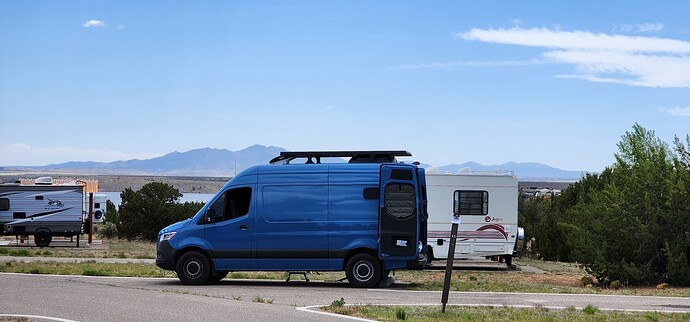Greetings & Welcome!
The PNW is one of my favorite areas. From the Cascades to the ocean, there’s lots of forests, lakes, rivers, streams, and of course the ocean. East of the Cascades is a lot of desert, but many people love that too.
Not a big fan of Harvest Hosts, they expect you to spend as much or more than you would in many campgrounds. There are many other apps for free camping spots.
I’m mostly a city dweller because everything’s so handy, and I can still park for free on the street. That way camping outside the city is still a treat.
For the bugs you’ll want window screens, and then I have a solar powered bug zapper that I just sit in a window to recharge.
The comfort & amenities are the most important for me. Besides a comfortable bed, I want a comfortable place to sit & work, lounge, or eat. I want my own toilet & shower, and fully functional kitchen. Last but certainly not least, I want 4 season climate control, THAT DOESN’T REQUIRE POWER!!! (My Peltier powered porable heat pump can run on <4a @ 12vdc, or without power on a tea light or liquid candle.)
None of my essentials require power, not my climate control, not their backups, not my fridge/freezer (3-Way), and I even have kerosene lanterns if needed. I have many 12v & USB luxuries, but when push comes to shove, I want to be able to live comfortably without the need for power. Solar is too unreliable, LifePo4 batteries are a bad joke, and I dislike being forced to drive to recharge my batteries, even though I love that feature for when I choose to drive. I do always carry a generator, and a battery charger too, but I don’t want to mess with them in the middle of cold stormy night.
Windows are important to me, more importantly OPENING WINDOWS. I want a 360° view at all times, and with opening windows I don’t need leaky roof vents. I have no holes in my roof, and no leaks. I prefer windows that tilt out at the bottom, or the jalousie type windows (louvered slats), so they can be open in the rain. While it’s possible to make rain proof covers for other window types, it’s a pain in the butt. Rain guards for the front windows are good though.
I prefer a portable, modular design myself. I don’t modify the vehicle. Not a single screw hole. I could transfer my whole conversion into a different van in an afternoon. Literally everything can be used either indoors or outdoors without duplication. If I need to temporarily move into a tent, I can take everything with me and live in luxury. Need a new van, no problem, my luxury accommodations can go with me. Instead of building anything in, I prefer to just move it in and then secure it.
Cheers!
"The boy scouts were right, 'Don't Be Scared, Be Prepared!'." ~ Truth Matters
![]()
![]()
